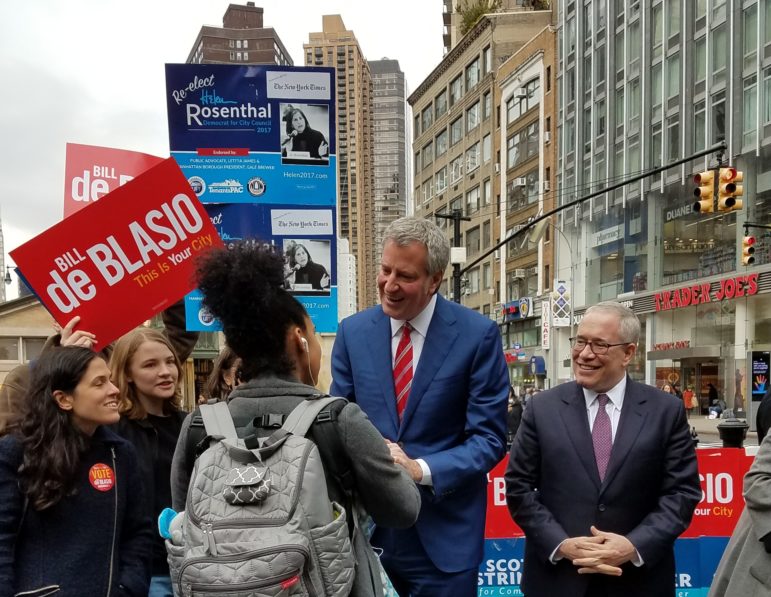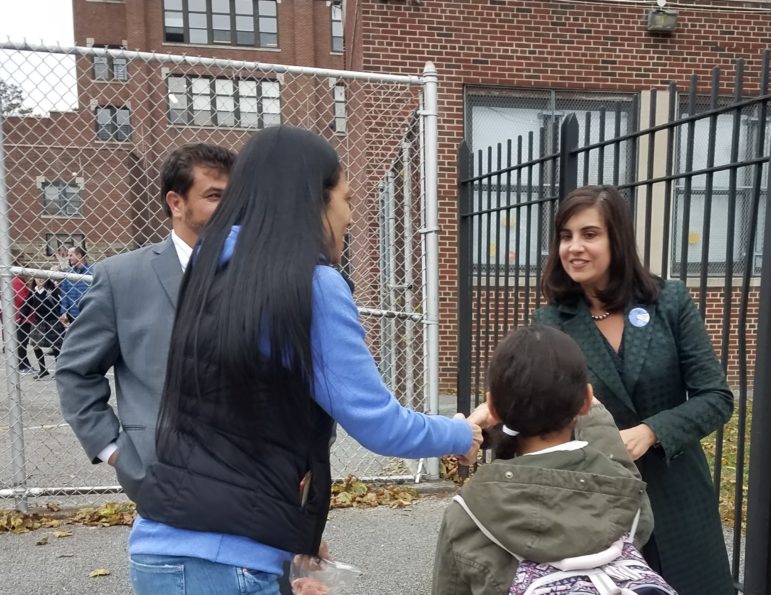
Murphy
Mayor de Blasio and Comptroller Scott Stringer met voters at 72nd and Broadway, Stringer is one of several officeholders facing term limits and eyeing a potential run for mayor.
A year ago New Yorkers watched election results and saw the whole world change. On Tuesday night, the city watched as virtually nothing changed.
The mayor was re-elected decisively—by just as enormous a margin as the polls said he would enjoy—as were the public advocate and comptroller. All five borough presidents were returned to office. The two sitting district attorneys on the ballot won easily.
All five incumbent City Council members who seemed in any danger of being thrown out of office prevailed, most rather easily. There was one surprise: As of Wednesday morning, City Councilmember Elizabeth Crowley of Queens trailed her Republican opponent Robert Holden by 113 votes out of 20,000 cast. But most Councilmembers were returned over only token opposition, and seven faced no opponent at all. Democratic favorites won all the open Council seats.
Turnout looked to be around 24 percent, not really better or worse than the last mayoral election.
Even the evening’s rhetoric was familiar. In his victory speech, Mayor de Blasio called for a tax on millionaires—much as he had four years ago when he was looking to fund his pre-K program. Now the tax is aimed at paying for mass transit improvements. It faces the same uphill battle in Albany that doomed the first effort.
Change gonna come
So, the cast of characters as of January 1 will largely be the same as it has been over the last for years. But change is coming anyway. Here are some clearly visible variables:
The city’s population is growing. While the 2006 PlaNYC project of 9 million residents by 2030 looks to have been about 10 years too early, that growth is still projected to be steady. That underlies the discussions about density and rezoning, and the adequacy of services like transit and parks as well. And Census 2020 will establish where those new people are, and trigger some reshifting of district lines.
A huge hit could be on its way from the federal government. Two of Mayor de Blasio’s deputy mayors and his budget director will hold a briefing on Wednesday on the potential impact of the Congressional Republican tax plan on city finances.
The 2018 state elections could alter the landscape, maybe to the city’s advantage if the state Senate flips to the Democratic side.
There’s going to be real pressure to do something about property taxes. The disparities and distortions in the current system have been well-known for years, and speaker Melissa Mark-Viverito gestured toward trying to solve them but the effort fizzled. Nicole Malliotakis almost succeeded in building property taxes into a powerful issue against the mayor, and de Blasio promised to at least start the process of considering—maybe even making—tough choices.
Ditto for Rikers. De Blasio may have been able to avoid #CloseRikers protestors on his way in to vote on Tuesday, but it’ll be harder to avoid making stronger commitments and actual policy moves toward shutting the island and moving to borough facilities.
And transit, too. Faulted by many for failing for so long to say much about the problems with the transit system, de Blasio brought it up early in his victory speech. While he framed it as a clarion call for a millionaire’s tax, the mayor will have to try to stay relevant in the conversation about transit even if the congestion-pricing approach wins out.
De Blasio will tackle these issues—and others, like the homelessness crisis and his bid for 90 new shelters—with a new speaker on the other side of City Hall. Mark-Viverito was a steady partner for the mayor. It is unclear that the relationship with the new legislative leader will be the same.
Term limits could affect that relationship. In fact, term limits could shape many of the policy debates over the next couple years. All the speaker candidates must leave the Council in 2021, as must the majority of the other Council members, all five borough presidents, the public advocate, the comptroller and, of course, the mayor himself. Term limits made 2017 a low-wattage race because incumbents with the option to stay put saw little reward in challenging other incumbents for higher office, especially when those posts will open up in four years. But now the clock is ticking, and it could trigger early maneuvering for 2021.
Meanwhile, the world is aging and the seas are rising. There are challenges facing the city that have nothing to do with our system of government, approach to taxation or history of incarceration.
‘We’ve got to do it soon. We’ve got to do it fast.’
During his re-election campaign, De Blasio talked little about new ideas to address all these issues. His biggest proposals—3K and adding 100,000 units to his housing plan—are significant but can be seen as expansions of his two most ambitious first-term initiatives. In his victory speech at the Brooklyn Museum, de Blasio intimated that more aggressive change would be needed: “We can’t stop now. We can’t stop now. Tonight there are too many of our fellow New Yorkers who feel the deck is stacked against them. Too many who feel they can’t achieve their potential. We know they’re right. We’ve got to become a fairer city. We’ve got to do it soon. We’ve got to do it fast.”
The fact that de Blasio’s reelection has been seen as very, very likely for months shouldn’t take away from the enormity of his accomplishment. He became the first Democratic mayor re-elected in 32 years and the first progressive mayor to be returned to power since 1969, and he was able to so largely because he avoided the pitfalls that were supposed to mar his term: rising crime and fiscal disaster.
He also was lucky to have an opponent whom he could outspend by a roughly four-to-one margin and label as a supporter of the least popular president in modern history. Were it not for Malliotakis’ hustle, the campaign might have been an even less satisfying contest of ideas.
A few hours before the polls closed on Tuesday, Malliotakis, tired after weeks of punishingly long campaign days, walked down a block in Throgs Neck toward the entrance to a Catholic school’s play yard. As midday moved toward evening it was getting colder and grayer and some sewage issue nearby meant that a foul odor wafted down the block every few minutes. But the GOP nominee was upbeat, especially when a girl came out of the yard with her parents. “The girl mayor! The first girl mayor!” the Staten Island Assemblywoman would shout, and offer high-fives to the often enthusiastic young women who came over to meet her. Malliotakis gamely crouched down, despite the clunky walking boot she’s wearing because of her foot injury, to pose for parents’ pictures.
After a few minutes her entourage drove around the corner to a row of modest, neat houses. The air grew a little colder. As her volunteers moved down the street knocking on doors to see if anyone was home to meet her, Malliotakis shook hands with one family, then realized she was due in Harlem soon, and said her goodbyes to the small crowd of Bronx loyalists who’d come out to help her.
Earlier, I asked if anything about the race had surprised her. “It was a clean race, really about the issues,” she said. “I thought, going into this, that they were going to try and crush me.”
It was 20 years ago on a similarly chilly night that a New York City mayoral candidate, Democrat Ruth Messinger, conceded her longshot bid to oust a polarizing but popular incumbent. “Somewhere out there, a little girl is watching this,” Messinger said that evening to a crowd at the Sheraton in Midtown. “And this message is for her: I didn’t become mayor tonight, young lady, but you will. As sure as I’m standing here, you will.” That’s one change that’s still pending.

Murphy
Nicole Malliotakis greeted voters outside a Catholic school in Throgs Neck.









2 thoughts on “The Election Changed Nothing in NYC. But Change is Coming All the Same.”
Pingback: Today’s Headlines – Streetsblog New York City
I am not looking forward to another De Blasio term. He favors developers and talked of forcing the homeless off the streets. Building more shelters does not mean better services, just warehousing.
I am concerned what rezoning will mean for middle class neighborhoods in the outer boroughs. Will the City threaten our quality of life?